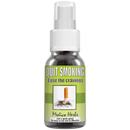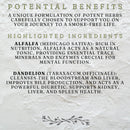Description
Quit Smoking Herbal Spray: Your Natural Path to Freedom
Discover the empowering blend of nature with our Quit Smoking Herbal Spray, a unique formulation of potent herbs carefully chosen to support you on your journey to a smoke-free life. Each ingredient is thoughtfully selected for its specific benefits to help you break free from the shackles of smoking.
Key Ingredients and Benefits:
-
Alfalfa (Medicago Sativa): Rich in nutrition, Alfalfa acts as a natural tonic, providing essential trace minerals and enzymes crucial for mental function.
-
Boneset (Eupatorium Perfoliatum): Relieves congestion, loosens phlegm, and has strong anti-inflammatory properties, making it beneficial for bronchitis and fever-induced discomfort.
-
Cayenne (Capsicum Frutescens): Stimulates circulation, strengthens the immune system, and acts as a catalyst. Studies suggest it may slow fat absorption and increase metabolic rate.
-
Dandelion (Taraxacum Officinale): Cleanses the bloodstream and liver, improves bile production, and acts as a powerful diuretic. Supports kidney, liver, and spleen health.
-
Ginkgo (Ginkgo Biloba): Enhances oxygen utilization and glucose intake at the cellular level, restoring energy production and known for its anti-depressant effects.
-
Ginger (Zingiber Officinale): Improves blood circulation, stimulates energy production, and has antibiotic properties. Supports cardiovascular health and mood.
-
Hyssop (Hyssopus Officinalis): Aids in eliminating toxins through the skin and mucous membranes, while helping regulate blood pressure.
-
Horsetail (Equisetum Arvense): Rich in silica, supports the absorption of calcium for healthy skin, hair, nails, and bones.
-
Kelp (Laminaria): Tones the thyroid and adrenals, boosting metabolism and energy production.
-
Calamus: Excellent tonic for the gastro-intestinal tract, used for dyspepsia, gastritis, and gastric ulcers.
-
Kanna (Sceletium): Mitigates stress and mental fatigue, offering support for low mood, anxiety states, and irritability.
-
Milk Thistle (Silybum Marianum): Assists with fat digestion, strengthens, and detoxifies the liver.
-
Peppermint (Mentha Piperita): Clears respiratory passages, has anti-inflammatory properties, and is effective against bacteria.
-
Skullcap (Scutellaria Lateriflora): Historically used to treat nervous diseases, insomnia, and restlessness.
Dosages for Quit Smoking Spray :
 Spray:
Spray:
Shake well before use. 2 - 3 squirts into mouth twice daily.
May be taken with fruit juice, herbal tea or water.
Our herbal tinctures are designed to enter the bloodstream through the soft tissues of the mouth, this ensures effectiveness and a much quicker result.
Contra-Indications:
 Consult your physician if pregnant, lactating or being treated for any chronic illness.
Consult your physician if pregnant, lactating or being treated for any chronic illness.
Citations :
-
Alfalfa (Medicago Sativa):
- Goyal, A., Sharma, V., Upadhyay, N., Gill, S., & Sihag, M. (2010). Medicinal plants: A potential source of compounds for drug development. In Medicinal Plants (pp. 17-64). Springer.
-
Boneset (Eupatorium Perfoliatum):
- Foster, S., & Duke, J. A. (1990). A Field Guide to Medicinal Plants: Eastern and Central North America. Houghton Mifflin.
-
Cayenne (Capsicum Frutescens):
- Srinivasan, K. (2016). Biological Activities of Red Pepper (Capsicum annuum) and Its Pungent Principle Capsaicin: A Review. Critical Reviews in Food Science and Nutrition, 56(9), 1488-1500.
-
Dandelion (Taraxacum Officinale):
- Ovadje, P., Chatterjee, S., Griffin, C., Tran, C., Hamm, C., & Pandey, S. (2011). Selective induction of apoptosis and autophagy through treatment with dandelion root extract in human pancreatic cancer cells. Pancreas, 40(5), 683-693.
-
Ginkgo (Ginkgo Biloba):
- Mix, J. A., & Crews, W. D. Jr. (2002). An examination of the efficacy of Ginkgo biloba extract EGb761 on the neuropsychologic functioning of cognitively intact older adults. Journal of Alternative and Complementary Medicine, 8(6), 811-817.
-
Ginger (Zingiber Officinale):
- Mashhadi, N. S., Ghiasvand, R., Askari, G., Hariri, M., Darvishi, L., & Mofid, M. R. (2013). Anti-oxidative and anti-inflammatory effects of ginger in health and physical activity: review of current evidence. International Journal of Preventive Medicine, 4(Suppl 1), S36.
-
Hyssop (Hyssopus Officinalis):
- El-Sayed, A. M., & Mahgoub, S. A. (2011). Antioxidant activity of hyssop, rosemary and oregano extracts in sunflower oil. World Applied Sciences Journal, 12(10), 1817-1824.
-
Horsetail (Equisetum Arvense):
- Salehi, B., Stojanović-Radić, Z., Matejić, J., Sharifi-Rad, M., Anil Kumar, N. V., Martins, N., ... & Martorell, M. (2019). The therapeutic potential of horsetail (Equisetum arvense L.). In Advances in Food and Nutrition Research (Vol. 90, pp. 261-291). Academic Press.
-
Kelp (Laminaria):
- Teas, J., Pino, S., Critchley, A., & Braverman, L. E. (2004). Variability of iodine content in common commercially available edible seaweeds. Thyroid, 14(10), 836-841.
-
Calamus:
- Khare, C. P. (2007). Indian Medicinal Plants: An Illustrated Dictionary. Springer.
-
Kanna (Sceletium):
- Smith, M. T., Crouch, N. R., & Gericke, N. (1996). Psychoactive constituents of the genus Sceletium N.E.Br. and other Mesembryanthemaceae: a review. Journal of Ethnopharmacology, 50(3), 137-152.
-
Milk Thistle (Silybum Marianum):
- Saller, R., Brignoli, R., Melzer, J., Meier, R., & Reginster, J. Y. (2008). An updated systematic review with meta-analysis for the clinical evidence of silymarin. Forschende Komplementärmedizin/Research in Complementary Medicine, 15(1), 9-20.
-
Peppermint (Mentha Piperita):
- McKay, D. L., & Blumberg, J. B. (2006). A review of the bioactivity and potential health benefits of peppermint tea (Mentha piperita L.). Phytotherapy Research, 20(8), 619-633.
-
Skullcap (Scutellaria Lateriflora):
- Awad, R., Arnason, J. T., Trudeau, V., Bergeron, C., Budzinski, J. W., Foster, B. C., & Merali, Z. (2003). Phytochemical and biological analysis of skullcap (Scutellaria lateriflora L.): a medicinal plant with anxiolytic properties. Phytomedicine, 10(8), 640-649.




